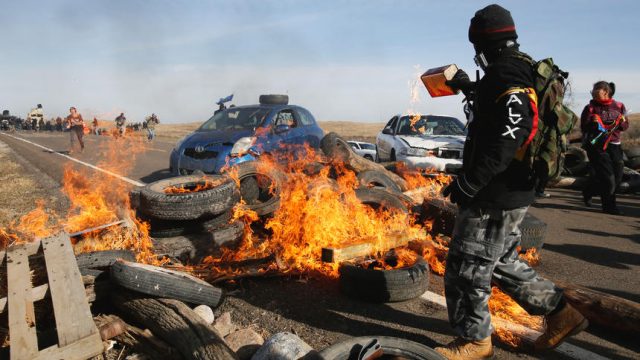If North Dakota’s Tribes Want Respect They Should Call Off the Rioters

A protestor pours gasoline on a fire blocking North Dakota Hwy. 1806 on Thursday, Oct. 27, 2016, north of Cannon Ball. Michael Vosburg / Forum Photo Editor
North Dakota lawmakers have voted to cancel for their 2017 session addresses to the legislature given by the state’s Native American tribes and judiciary. The reason for this is security concerns related to the pugnacious, unlawful, and often violent protests against the Dakota Access Pipeline.
In a recent interview on my radio show on WDAY AM970 House Majority Leader Al Carlson told me there may be more restrictions too for the coming 2017 Legislative session (audio below).
Predictably this has resulted in some political backlash. “It’s a really bad time to have less interactions with our tribes,” state Rep. Marvin Nelson told reporter Amy Dalrymple. “We need more interaction and more talk.”
Chairman Richard McCloud of the Turtle Mountain Band of Chippewa called it a “dishonor” pointing out that most of the protesters arrested have been from out of state. “Unfortunately, it seems like North Dakota tribes are going to have to suffer the cost,” he said.
The Fargo Forum blasted the decision in an editorial. “We should be trying to open doors to dialogue, not slamming them shut,” they write.
But there is a question worth asking about just who it is slamming doors shut.
North Dakota’s tribes like to talk about their nation-to-nation relationship with non-tribal governments, and they’re right to. And sometimes when relations between two nations are harmed by the actions of one of them a proper response is to reduce diplomatic ties.
[mks_pullquote align=”left” width=”300″ size=”24″ bg_color=”#ffffff” txt_color=”#000000″]They have partnered with a far-left extremist group called Earthjustice to challenge the Dakota Access Pipeline, and then invited all manner of activists to the state to help further their cause. Those activists are now terrorizing south central North Dakota.[/mks_pullquote]
The Standing Rock Sioux Tribe, with the active support of the state’s other tribes, has disrespected the State of North Dakota. They have partnered with a far-left extremist group called Earthjustice to challenge the Dakota Access Pipeline, and then invited all manner of activists to the state to help further their cause.
Those activists are now terrorizing south central North Dakota. Schools are routinely placed on lock down. State workers in the capitol are bombarded with emergency alerts when protesters try to force their way into the building. Businesses in Bismarck and Mandan routinely see commerce disrupted when protesters illegally block streets and sidewalks. Ranchers have seen their livestock harassed and stolen.
The men and women of law enforcement charged with attempting to keep the peace in the face of what has been, at times, almost daily rioting have been pushed near a breaking point. They’ve been spit at and assaulted. They’ve been made the targets for thrown rocks and homemade bombs. And when they’ve deployed armored vehicles riot gear, and non-lethal tools like pepper spray to deal with the violent mobs invited to our state by the Standing Rock tribe they’re ripped – completely unfairly – by everyone from tribal leaders to United Nations representatives to the ACLU.
This last week protesters rioting near Mandan tried to block railroad tracks with a burning pickup. Thankfully law enforcement was able to stop protesters from starting the fire and get the train traffic stopped until the tracks could be cleared.
Back in October one of the protesters, a woman named Red Fawn Fallis, was arrested and charged with attempted murder after she allegedly fired a handgun at police officers. Video posted online shows Fallis narrowly missing officers who were in the process of cuffing her.
Yet currently the #NoDAPL protesters are demanding with chants and signs that she be released.
What have tribal officials done in the state in terms of condemning this violence? What have they done to expel the extreme and violent factions of this movement they’ve formed?
Almost nothing.
The tribes often talk of wanting respect for their communities and causes, and there is no questioning the historical wrongs done to our indigenous neighbors. The American government has very often been disrespectful and dishonest to Native Americans.
But today, in the summer and fall of 2016, our Native American neighbors have disrespected our state, and as such have damaged that nation-to-nation relationship. If they want to repair it, they could start by condemning the #NoDAPL violence and rioting and working to end it.
Maybe then we can get back to normal diplomatic relations.
[fcc_jw_podcast key=”LOGC650m” player-image=”134785″]




